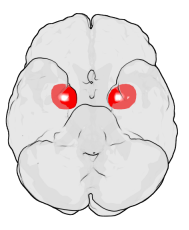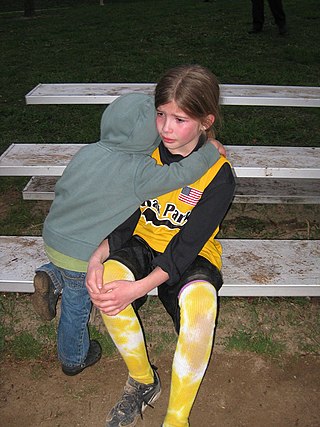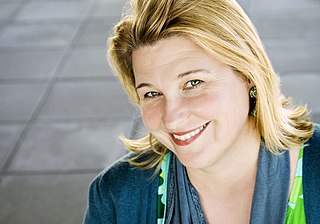Related Research Articles

Altruism is the principle and practice of concern for the well-being and/or happiness of other humans or animals. While objects of altruistic concern vary, it is an important moral value in many cultures and religions. It may be considered a synonym of selflessness, the opposite of selfishness.

The amygdala is one of two almond-shaped clusters of nuclei located deep and medially within the temporal lobes of the brain's cerebrum in complex vertebrates, including humans. Shown to perform a primary role in the processing of memory, decision making, and emotional responses, the amygdalae are considered part of the limbic system. The term "amygdala" was first introduced by Karl Friedrich Burdach in 1822.

Remorse is a distressing emotion experienced by an individual who regrets actions which they have done in the past that they deem to be shameful, hurtful, or wrong. Remorse is closely allied to guilt and self-directed resentment. When a person regrets an earlier action or failure to act, it may be because of remorse or in response to various other consequences, including being punished for the act or omission. People may express remorse through apologies, trying to repair the damage they've caused, or self-imposed punishments.

Empathy is the capacity to understand or feel what another person is experiencing from within their frame of reference, that is, the capacity to place oneself in another's position. Definitions of empathy encompass a broad range of social, cognitive, and emotional processes primarily concerned with understanding others. Types of empathy include cognitive empathy, emotional empathy, somatic empathy, and spiritual empathy.

Antonio Damasio is a Portuguese-American neuroscientist. He is currently the David Dornsife Chair in Neuroscience, as well as Professor of Psychology, Philosophy, and Neurology, at the University of Southern California, and, additionally, an adjunct professor at the Salk Institute. He was previously the chair of neurology at the University of Iowa for 20 years. Damasio heads the Brain and Creativity Institute, and has authored several books: his work, Self Comes to Mind: Constructing the Conscious Brain (2010), explores the relationship between the brain and consciousness. Damasio's research in neuroscience has shown that emotions play a central role in social cognition and decision-making.
Sympathy is the perception of, understanding of, and reaction to the distress or need of another life form. According to philosopher David Hume, this sympathetic concern is driven by a switch in viewpoint from a personal perspective to the perspective of another group or individual who is in need. Hume explained that this is the case because "the minds of all men are similar in their feelings and operations" and that "the motion of one communicates itself to the rest" so that as "affections readily pass from one person to another… they beget correspondent movements." Along with Hume, two other men, Adam Smith and Arthur Schopenhauer, worked to better define sympathy. Hume was mostly known for epistemology, Smith was known for his economic theory, and Schopenhauer for the philosophy of the will. An American professor, Brene Brown, views sympathy as a way to stay out of touch with one's emotions. They attempt to make sense out of the situation and see it from the person receiving the sympathy's perception.
C. Daniel Batson is an American social psychologist. He has two doctoral degrees, in theology and psychology. Batson obtained his doctorate under John Darley and taught at the University of Kansas. He retired in 2006 and now is an emeritus professor in the psychology department at the University of Tennessee. He is best known for his contributions to three fields: the social psychology of altruism, empathic concern, and psychology of religion.

Lisa Feldman Barrett is a University Distinguished Professor of psychology at Northeastern University, where she focuses on affective science. She is a director of the Interdisciplinary Affective Science Laboratory. Along with James Russell, she is the founding editor-in-chief of the journal Emotion Review. Along with James Gross, she founded the Society for Affective Science.

Jean Decety is an American-French neuroscientist specializing in developmental neuroscience, affective neuroscience, and social neuroscience. His research focuses on the psychological and neurobiological mechanisms underpinning social cognition, particularly social decision-making, empathy, moral reasoning, altruism, pro-social behavior, and more generally interpersonal relationships. He is Irving B. Harris Distinguished Service Professor at the University of Chicago.
Empathy-altruism is a form of altruism based on moral emotions or feelings for others.

The ventromedial prefrontal cortex (vmPFC) is a part of the prefrontal cortex in the mammalian brain. The ventral medial prefrontal is located in the frontal lobe at the bottom of the cerebral hemispheres and is implicated in the processing of risk and fear, as it is critical in the regulation of amygdala activity in humans. It also plays a role in the inhibition of emotional responses, and in the process of decision-making and self-control. It is also involved in the cognitive evaluation of morality.
Empathic concern refers to other-oriented emotions elicited by, and congruent with the perceived welfare of, someone in need. These other-oriented emotions include feelings of tenderness, sympathy, compassion and soft-heartedness.

Tania Singer is a German psychologist and social neuroscientist and the scientific director of the Max Planck Society's Social Neuroscience Lab in Berlin, Germany. Between 2007 and 2010, she became the inaugural chair of social neuroscience and neuroeconomics at the University of Zurich and was the co-director of the Laboratory for Social and Neural Systems Research in Zurich. Her research focuses on the developmental, neuronal, and hormonal mechanisms underlying human social behavior and social emotions such as compassion and empathy. She is founder and principal investigator of the ReSource project, one of the largest longitudinal studies on the effects of mental training on brain plasticity as well as mental and physical health, co-funded by the European Research Council. She also collaborates with the macro-economist Dennis Snower on research on caring economics. Singer's Caring Economics: Conversations on Altruism and Compassion, Between Scientists, Economists, and the Dalai Lama was published in 2015. She is the daughter of the neuroscientist Wolf Singer.
Social emotions are emotions that depend upon the thoughts, feelings or actions of other people, "as experienced, recalled, anticipated or imagined at first hand". Examples are embarrassment, guilt, shame, jealousy, envy, elevation, empathy, and pride. In contrast, basic emotions such as happiness and sadness only require the awareness of one's own physical state. Therefore, the development of social emotions is tightly linked with the development of social cognition, the ability to imagine other people's mental states, which generally develops in adolescence. Studies have found that children as young as 2 to 3 years of age can express emotions resembling guilt and remorse. However, while five-year-old children are able to imagine situations in which basic emotions would be felt, the ability to describe situations in which social emotions might be experienced does not appear until seven years of age.
Pain empathy is a specific variety of empathy that involves recognizing and understanding another person's pain.

Kay M. Tye is an American neuroscientist and professor and Wylie Vale Chair in the Salk Institute for Biological Sciences. Her research has focused on using optogenetics to identify connections in the brain that are involved in innate emotion, motivation and social behaviors.
Neuromorality is an emerging field of neuroscience that studies the connection between morality and neuronal function. Scientists use fMRI and psychological assessment together to investigate the neural basis of moral cognition and behavior. Evidence shows that the central hub of morality is the prefrontal cortex guiding activity to other nodes of the neuromoral network. A spectrum of functional characteristics within this network to give rise to both altruistic and psychopathological behavior. Evidence from the investigation of neuromorality has applications in both clinical neuropsychiatry and forensic neuropsychiatry.
Jonathan B. Freeman is an American psychologist and associate professor of psychology at Columbia University. He is best known for his work on the neuroscience of person perception and social cognition, as well as mouse-tracking methodology in cognitive science. His research focuses on the cognitive and neural mechanisms underlying split-second social judgments and their impact on behaviour.
Omri Gillath is an Israeli-American social psychologist. As a professor of social psychology at the University of Kansas, Gillath has spent over 20 years doing research, teaching psychology, and mentoring students. He is a leading figure in the field of close relationships and has over 100 publications in peer-reviewed psychology journals. His research interests include: close relationships, attachment theory, brain mechanisms and genetic polymorphisms underlying attachment style, social networks, and recently, humans connections with AI.
An empathy gap, sometimes referred to as an empathy bias, is a breakdown or reduction in empathy where it might otherwise be expected to occur. Empathy gaps may occur due to a failure in the process of empathizing or as a consequence of stable personality characteristics, and may reflect either a lack of ability or motivation to empathize.
References
- 1 2 "Book Prize for the Promotion of Social and Personality Science | SPSP". spsp.org.
- 1 2 "Author Abigail Marsh on the Black Eyed Peas". wsj.com. January 3, 2018.
- 1 2 3 4 Dec 2017, Teresa Wiltz ’83 | Nov-. "What Makes Nice People Nice?". Dartmouth Alumni Magazine.
{{cite web}}: CS1 maint: multiple names: authors list (link) - ↑ "How Fear Makes You Do Good Or Evil". National Geographic News. January 3, 2018.
- ↑ "Georgetown University Faculty Directory". gufaculty360.georgetown.edu.
- 1 2 3 "The S&R Kuno Award Winners | S&R Foundation". sandrfoundation.org. Archived from the original on 2020-08-05. Retrieved 2020-04-17.
- ↑ "Researchers | Prospective Psychology". www.prospectivepsych.org.
- 1 2 "The Altruistic Brain: Making the Choice to Help". Boston College Events.
- 1 2 "Abigail Marsh – Roots of Empathy".[ permanent dead link ]
- ↑ "11 Faculty Receive Tenure". October 18, 2013.
- ↑ "NSF Award Search: Award#1729406 - Neural and cognitive bases of costly altruism toward strangers". www.nsf.gov.
- ↑ "Abigail Marsh". Donor to Donor. Archived from the original on 2019-08-29. Retrieved 2020-04-16.
- ↑ Strub, Chris. "Donor-To-Donor Kidney Chains Personify American Selflessness, Save Lives". Forbes.
- ↑ Marsh, Abigail (March 14, 2019). "Less Guilty by Reason of Neurological Defect" – via Slate.
- ↑ "Does Taking Pleasure in Giving to Others Make Us Selfish?". Psychology Today.
- ↑ Marsh, Abigail. "I studied children with psychopathic traits, and they all have trouble recognizing an emotion that we all feel". Business Insider.
- ↑ Marsh, Abigail (October 22, 2017). "Brain unpicked: what makes a child psychopathic? | Abigail Marsh" – via www.theguardian.com.
- ↑ "Could A More Individualistic World Also Be A More Altruistic One?". NPR.org.
- ↑ Marsh, Abigail (October 1, 2017). "Choosing Fear" – via The Chronicle of Higher Education.
- 1 2 Marsh, Abigail. "Abigail Marsh | Speaker | TED". www.ted.com.
- ↑ Marsh, Abigail. "Why some people are more altruistic than others" – via www.ted.com.
- ↑ "Impulses, intent, and the science of evil". Science | AAAS. July 31, 2019.
- ↑ "Right on!" – via The Economist.
- ↑ Luong, Lia Kantrowitz, Shayla Love, Tony (May 7, 2019). "This Doctor's Rare Condition Might Help Us Understand the Roots of Empathy".
{{cite web}}: CS1 maint: multiple names: authors list (link) - ↑ "For the first time, a neural link between altruism and empathy toward strangers". ScienceDaily.
- 1 2 Carter, Claire (October 24, 2017). "Inside minds of child psychopaths - and surprising trait they inherit from mums". mirror.
- ↑ "Abigail Marsh". Center for Computation & Technology.
- ↑ Moffett, Mark W. (May 10, 2019). "The Social Secret That Humans Share With Ants" – via www.wsj.com.
- ↑ "Marsh Receives Cozzarelli Prize for Outstanding Research on Altruism". Association for Psychological Science - APS.
- ↑ "Abigail Marsh".
- ↑ Murphy, Heather (April 24, 2018). "Why It Seems as if Everyone Is Always Angry With You" – via NYTimes.com.